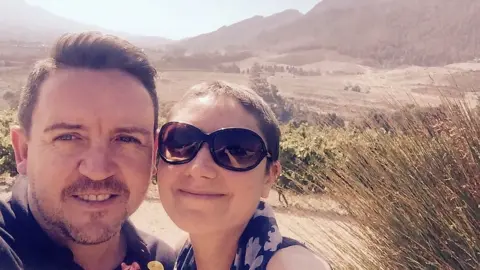Terminal breast cancer patients 'abandoned' in nurse shortage
 asiseeit
asiseeitThousands of incurable breast cancer patients are being denied a dedicated specialist nurse, according to Breast Cancer Care.
The figures show almost three-quarters (72%) of NHS Trusts across the UK are not providing designated nurses.
Three years ago, the government promised all cancer patients would have access to a designated nurse by 2020.
The Department of Health said it was "committed to increasing the capacity" of specialist cancer nurses.
Samia al Qadhi, chief executive of charity Breast Cancer Care, hit out at the deterioration in patient care.
"Our staggering figures reveal just how much NHS nursing care for people with incurable breast cancer has stagnated," she said.
"After this life-changing diagnosis, patients continue to be abandoned without ongoing specialist support they need to manage complex treatment and debilitating side effects, like chronic pain and fatigue."
The charity contacted NHS health trusts in the UK and obtained the data under Freedom of Information laws.
'I was frightened and isolated'
Jo Myatt, 42, from Chorley, was diagnosed with incurable secondary breast cancer in August 2016, 10 years after primary breast cancer, and after many years of clear mammograms.
She was told that the cancer had spread to her liver and bones.
 Jo Myatt
Jo Myatt"Following my diagnosis, in the space of a 20-minute consultation, I felt I lost my identity and my future with those I love.
"Support following my diagnosis was non-existent. There were no specialist or secondary breast care nurses. I was told by a GP on a Friday evening and sent home with my husband with a lack of knowledge and lack of a plan.
"I was left completely in the dark, frightened, isolated and devastated."
Jo had to change hospitals in order to get a specialist nurse last year, who now supports her "physically and emotionally" and she is now campaigning for more nurses to be available to those with incurable cancer.
"Now I can just email my nurse about treatment and side effects. It's so stressful trying to keep track of all the different treatments and appointments, and the nurse helps me co-ordinate it all."
Nurses are 'most important' aspect of care
There are an estimated 35,000 people with secondary breast cancer (also known as metastatic, advanced or stage four breast cancer), and each year around 11,500 die from the disease.
A few will have a dedicated nurse, while others will have a nurse who splits their time between primary and secondary breast cancer patients.
Life expectancy for secondary breast cancer patients varies, but, as treatments have improved, more people are living longer after a diagnosis, making specialist care even more essential.
Ms al Qadhi said: "People living with incurable breast cancer tell us that access to a specialist nurse is the single most important aspect of their care and without it they feel isolated, forgotten and invisible.
"So today's failings must not be swept under the carpet. We are calling on the government to create a secondary support package for incurable breast cancer."
An NHS spokesperson said: "Everyone with cancer is unique and patients themselves say their experience of being looked after is getting better every year - which makes sense as your chance of surviving cancer is now at its highest ever."
